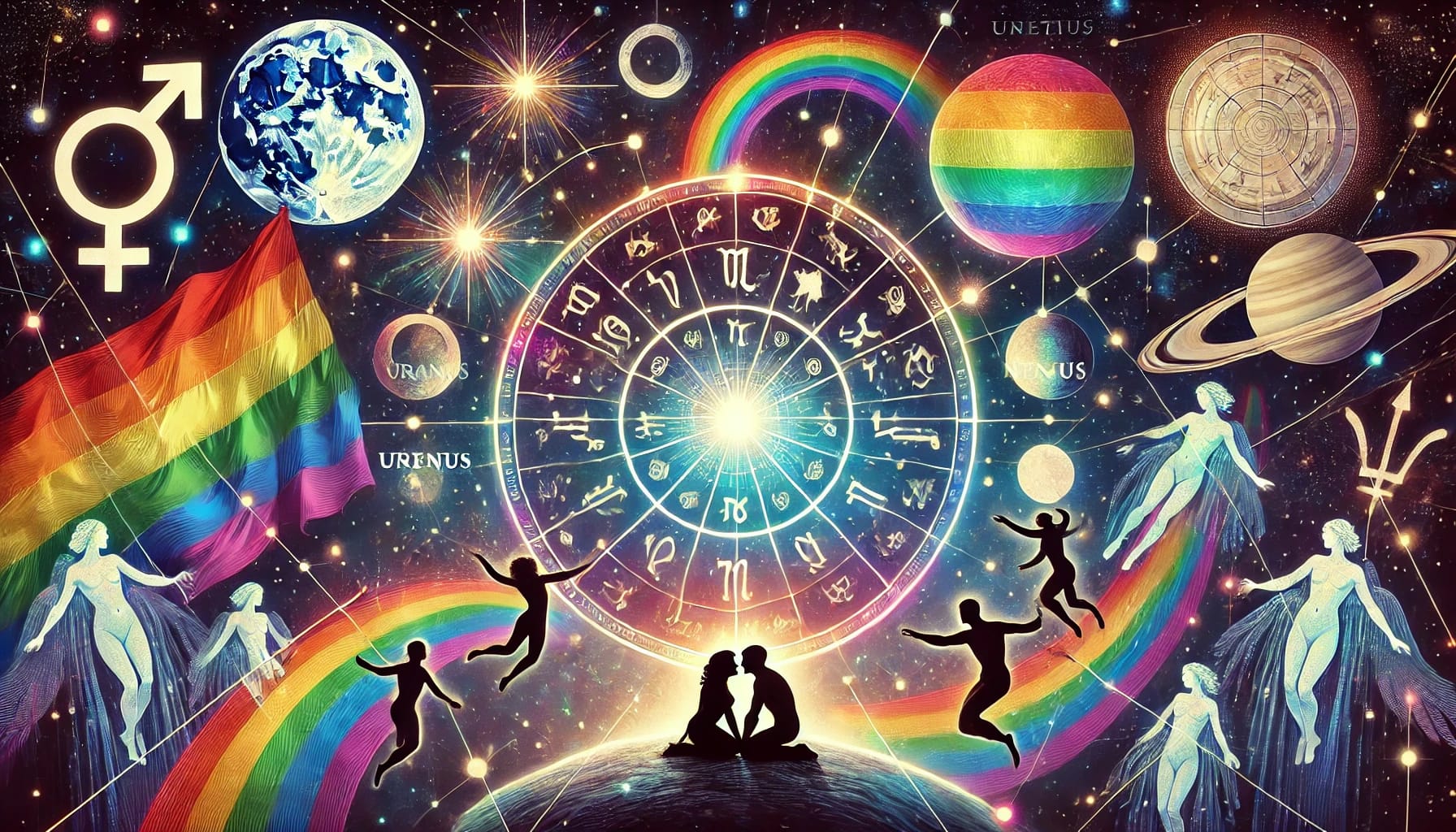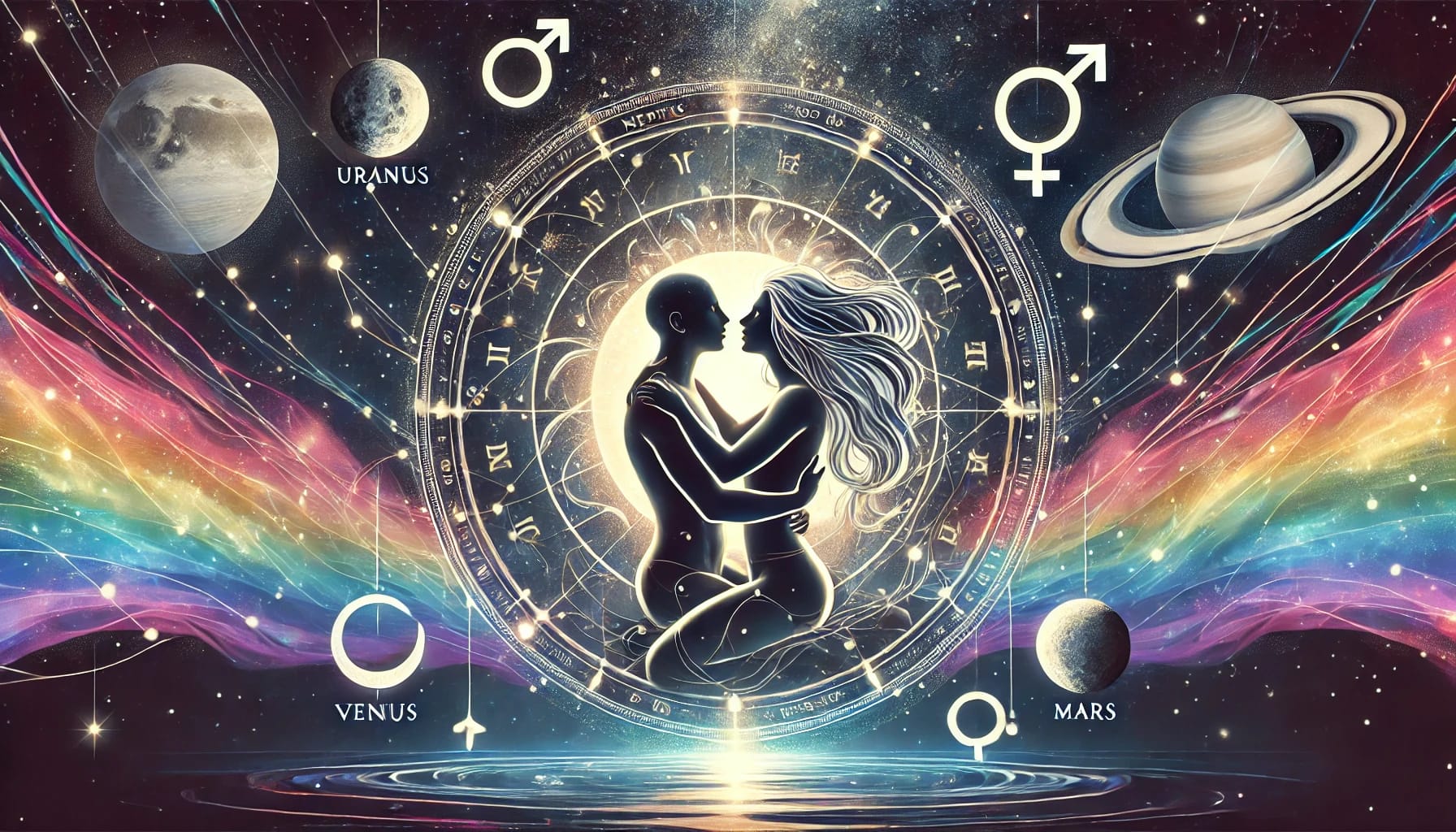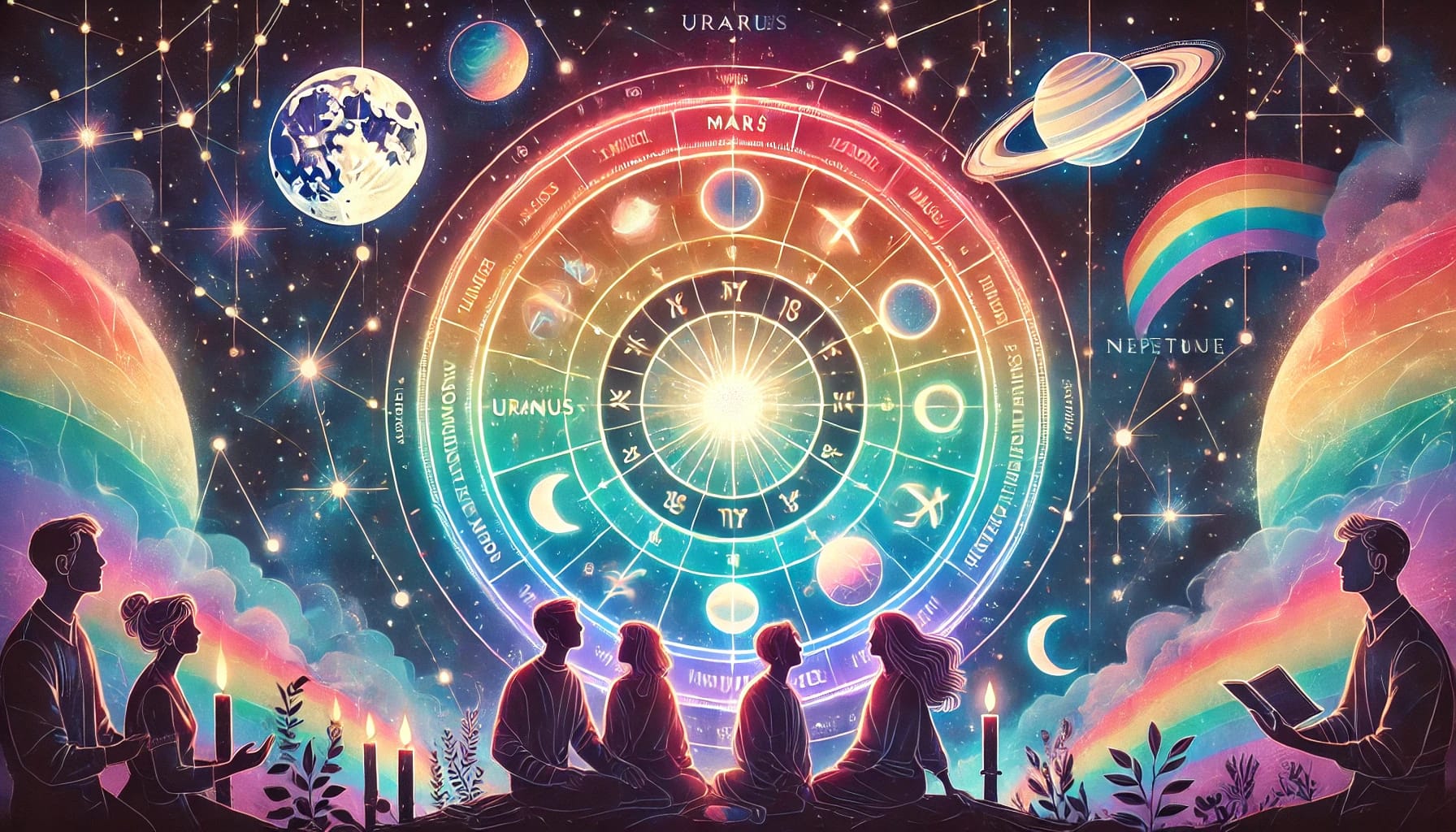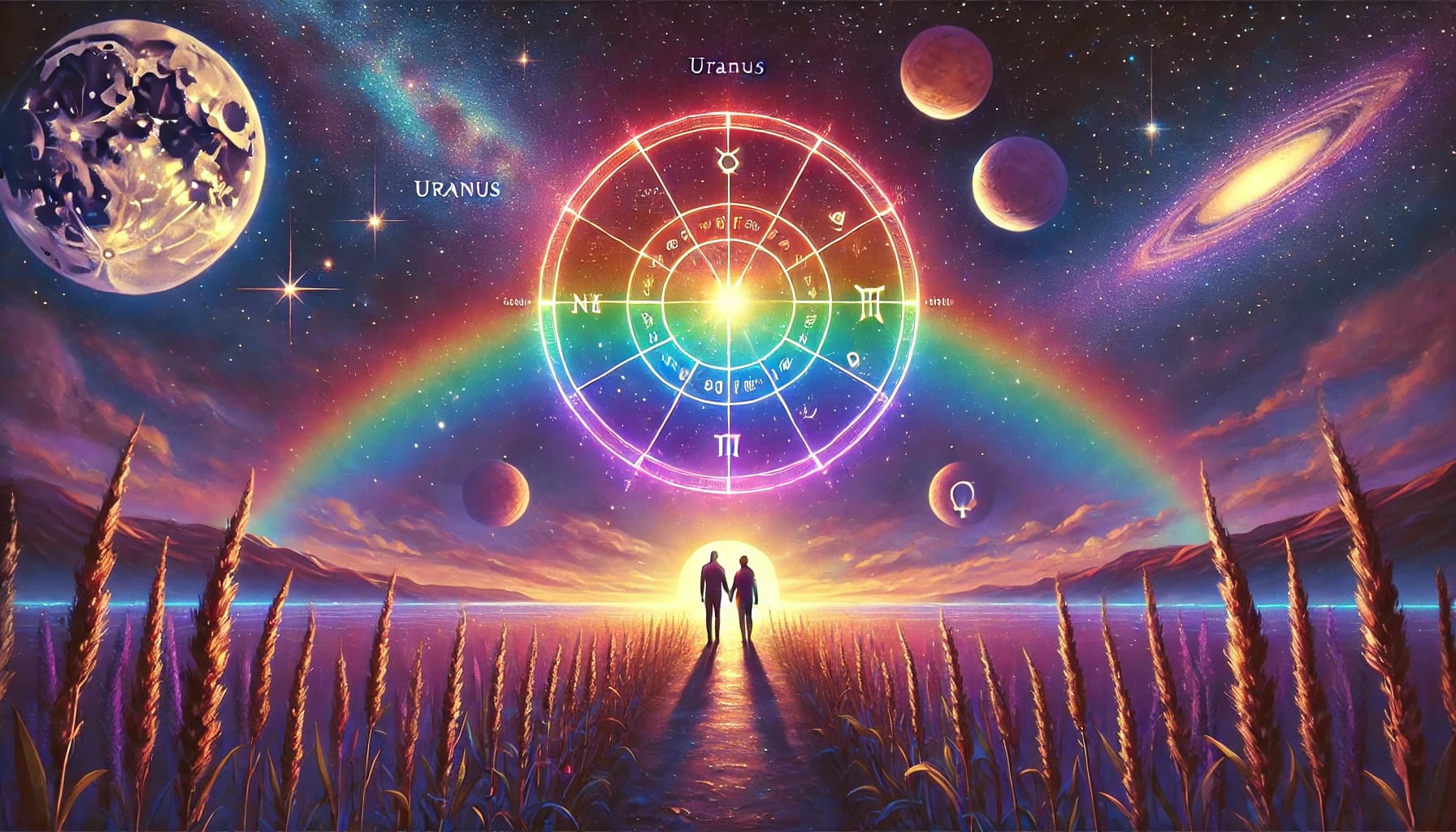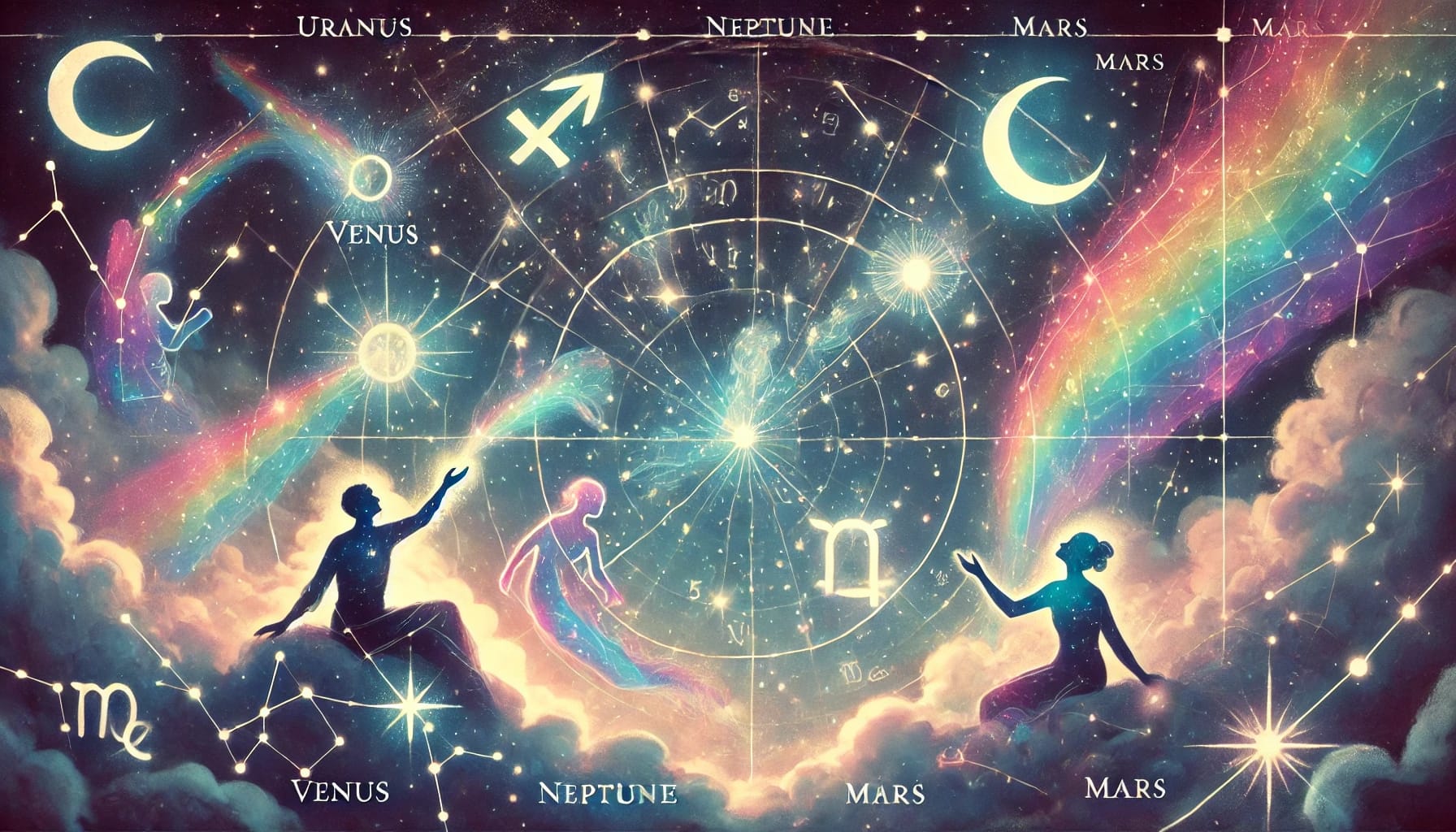Same-Sex Attraction in Astrology
Homosexuality in Astrology: Key Planetary Influences
In astrological analysis, the planets Uranus (♅) and Neptune (♆) are particularly significant when it comes to themes of homosexuality and bisexuality. Uranus, associated with freedom, change, and rebellion, and Neptune, representing romance, illusion, and spiritual sensitivity, play pivotal roles in shaping nontraditional expressions of love and sexuality.
When Uranus entered Aquarius (♒)—its ruling sign—in 1996, it marked a societal shift. This transit initiated a period of growing openness and visibility for same-sex love, especially among younger generations. With Uranus in Aquarius, a powerful radical change emerged. Young people began exploring sexuality more freely—through online platforms, social events, and even through the formation of LGBTQ+ communities and gatherings.
Neptune, as a symbol of escapism, dreams, and altered states (often linked with substances like alcohol and drugs), also contributed to this era of experimentation and emotional openness. The combination of Uranus and Neptune’s energies brought about not only an increase in same-sex relationships but also a broader acceptance of diverse sexual identities.
Astrological indicators of same-sex attraction often include challenging or dynamic aspects involving Uranus (♅), Neptune (♆), Venus (♀), Mars (♂), and the Moon (☾). For instance:
- Hard aspects between ♆ and ♅ (squares or oppositions) often correspond with unconventional or fluid sexual preferences.
- ♀ in conjunction, square, or opposition with ♅ can indicate openness to same-sex relationships.
- ☾ in mutable or emotionally unstable signs (♍, ♊, ♓, ♒) may suggest a propensity for bisexuality due to emotional variability.
- Neptune conjunct the Ascendant (⊖) can suggest sensitivity to paranormal or non-traditional sexual experiences.
- ♀ square or opposite ♆ can signify bisexual tendencies, especially when combined with other indicators.
To identify homosexuality or bisexuality in a natal chart, multiple factors must align—ideally at least four clear indicators. A single aspect is not sufficient for a definitive conclusion.
Important Astrological Houses and Signs
- The 5th house governs romantic and love affairs, while the 8th house rules sexuality and intimacy. Their rulers and aspects provide insight into a person’s sexual preferences.
- The Moon (☾) reveals emotional needs and responses, and its aspects to ♀, ♂, ♅, ♆, and sometimes Pluto (♇), are key.
- A 5th house in Aquarius (♒), or its ruler in hard aspect to Uranus, suggests unconventional romantic experiences, possibly including same-sex relationships.
- The 7th house (partnerships), 11th house (friendships, community), and 12th house (hidden aspects of the self) are also relevant.
- Venus and Mars in mutable signs (♊, ♍, ♐, ♓), or in dual degrees, can imply sexual fluidity or internal conflict around desire.
- The 8th house in Taurus (♉), when paired with other indicators, can point to sensuality and a strong need for intimate physical connection—often kept private.
Specific Planetary Aspects and Indicators
- ☉ conjunct ♄, both squaring ♆, is a deeply emotional aspect often found in individuals struggling with suppressed or complicated sexual identities.
- ☾ square ♅ is commonly found in the charts of individuals who experience same-sex attraction or emotional openness toward the same gender.
- ♆ in the 7th house, square to ♅, may confirm same-sex orientation.
- Venus or Mars in conjunction and both in hard aspect to Neptune or Uranus may signal a nontraditional sexual orientation.
- Planets like ♀, ♂, ♄, and ☾ in feminine signs may suggest effeminate tendencies, particularly in men.
- Critical degrees in ♊—especially the 7th or 9th—are notable when occupied by Venus or Mars.
Emotional and Social Characteristics
Individuals with strong Uranian or Neptunian influence tend to be emotionally nuanced, empathetic, and attuned to the experiences of others. This can lead to deep sensitivity, a refined sense of aesthetics, and a greater acceptance of diversity in love. Many LGBTQ+ individuals exhibit high emotional intelligence and compassion, traits often governed by Neptune and Uranus.
Conclusion
Astrology offers a symbolic language for understanding sexuality, but it must be approached with care, nuance, and respect for individual complexity. No single aspect defines a person’s orientation; rather, it’s the combination of planetary positions, aspects, and house placements that form a broader picture. To truly assess sexual orientation through astrology, a full natal chart analysis is essential—considering multiple planetary influences and their interconnections.
🌈 Astrology Checklist for Same-Sex Attraction Indicators
How to Use This Table
- Start with the 5th and 8th houses and their rulers.
- Check all major aspects (☌, □, ☍) involving Uranus, Neptune, Venus, Mars, and the Moon.
- Watch for planets in dual/mutable signs and critical degrees.
- Look for patterns, not just one-off placements.
- Confirm only if 4 or more strong indicators align.
| Category | Astrological Indicator | Interpretation |
|---|---|---|
| Key Planets | ♅ (Uranus), ♆ (Neptune), ♀ (Venus), ♂ (Mars), ☾ (Moon), ☉ (Sun) | Core planets for analyzing sexuality, emotions, and attraction. |
| Important Houses | 5th (love/romance), 8th (sex), 7th (partnerships), 11th (community), 12th (hidden life), 4th (roots) | These houses must be evaluated for deeper understanding. |
| Uranus Aspects | ♀ ☌/□/☍ ♅ or ♂ ☌/□/☍ ♅ | Suggests non-traditional or free love; openness to same-sex attraction. |
| ☾ □ ♅ | Emotional independence, rebellion, often present in gay individuals. | |
| ♅ in 5th or 7th house | Unconventional love or partnerships; possibly same-sex. | |
| Neptune Aspects | ♆ □ ♅ | Indicates sexual fluidity, romantic confusion, and openness. |
| ♆ □ or ☍ ☉ / ☾ | Attraction to elusive or dreamy partners; often same-sex or spiritualized love. | |
| ♆ in 7th house | Romantic idealism, often involving same-sex or alternative relationships. | |
| Venus Indicators | ♀ ☌/□/☍ ♅ or ♆ | Love and desire for unconventional or dreamy partners. |
| ♀ opposition ♆ | Indicates bisexuality or romantic confusion. | |
| ♀ in mutable or dual signs (♊, ♍, ♐, ♓) | Love fluidity, potential bisexuality. | |
| Mars Indicators | ♂ in dual/mutable signs | Sexual fluidity, especially in men. |
| ♂ □ or ☍ ♆ or ♅ | Conflicts or openness around sexuality. | |
| Moon Indicators | ☾ in ♊, ♍, ♓, ♒ | Emotional variability; openness to bisexuality or non-traditional attraction. |
| ☾ □ ♅ | Tension in emotional expression, often same-sex related. | |
| ☾ ☌ ☉ and both square ♆ | Confirms inner emotional conflict related to sexual identity. | |
| Sun Indicators | ☉ ☌ ♄ and both square ♆ | Emotional repression, eventual release through same-sex expression. |
| House Significance | 5th house in ♒ | Unusual, spontaneous love, frequent same-sex attraction. |
| 8th house in ♉ | Secretive sensuality, same-sex exploration. | |
| Ruler of 5th in square/opposition to planet in 5th | Conflicted love life, often non-traditional. | |
| Degrees to Watch | ♀ or ♂ at 7° or 9° of ♊ | Critical degrees—emotional and sexual experimentation. |
| Any planets in dual degrees or mutable signs | Emphasize duality and flexibility in sexual orientation. | |
| Number of Indicators | At least 4 significant indicators required | A single aspect is not enough—multiple signs must be present. |
| Bonus Insight | ⚸ (Lilith) in harsh aspect to ☾, ♀, ♂ | Hidden or taboo sexuality; sexual turbulence. |


